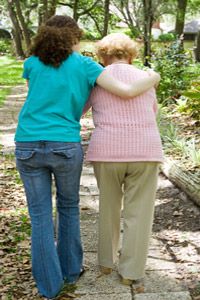For many people, there's no hesitation to help out when it's time to care for a loved one who's lost independence due to health problems, old age, dementia or any other reason. Existing workloads are rearranged, large sacrifices are made of time, effort and money, and the well-being of the loved one in need is given top concern. Often without medical training or even much notice, these people rise to the unexpected challenge of maintaining another person's health, daily routines, eating, sleeping and bathing schedules, medical appointments and financial obligations.
The caregiver's life may soon seem no longer recognizable to him or her. Hard-earned careers sometimes must be put on hold, perhaps indefinitely. Daily exercise and alone time are now little more than daydreams. Daily victories seem to be greatly outnumbered by daily setbacks in the care giving of the homebound loved one. Self-expectations remain high and personal disappointments pile higher.
Advertisement
Resentments may grow, leading to feelings of guilt and anger. Anxiety and isolation seem to have no relief in sight. These are common feelings among caregivers, and they are symptoms of caregiver burnout -- total exhaustion of the mind, body and spirit. In this article, we'll talk about five ways to avoid burnout by dealing with the burdens of caring for another. First up: taking care of the caregiver.





